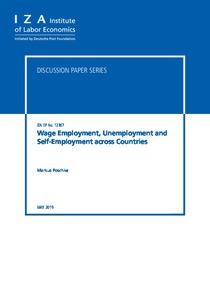Wage employment, unemployment and self-employment across countries
"Poor countries have low rates of wage employment and high rates of self-employment. This paper shows that they also have high rates of unemployment relative to wage employment, and that self-employment is particularly high where the unemployment-wage employment ratio is high. I interpret high...
| Main Author: | |
|---|---|
| Institution: | ETUI-European Trade Union Institute |
| Format: | TEXT |
| Language: | English |
| Published: |
Bonn
2019
IZA |
| Subjects: | |
| Online Access: | https://www.labourline.org/KENTIKA-19308470124911266529-Wage-employment,-unemployment-.htm |
| Summary: | "Poor countries have low rates of wage employment and high rates of self-employment. This paper shows that they also have high rates of unemployment relative to wage employment, and that self-employment is particularly high where the unemployment-wage employment ratio is high. I interpret high unemployment-employment ratios as evidence of labor market frictions, and develop a simple heterogeneous-firm search and matching model with choice between job search and self-employment to analyze their effect. Quantitative analysis of the model, separately calibrated to eight countries, shows that variation in labor market frictions can explain almost the entire variation in not only unemployment, but also wage employment and self-employment across the calibration countries. The model generates joint variation in unemployment and self-employment accounting for at least a third of their relationship in the data. Labor market frictions reduce output not only by affecting employment, but also by pushing searchers into low-productivity own-account work." |
|---|---|
| Physical Description: | 74 p. Digital |

